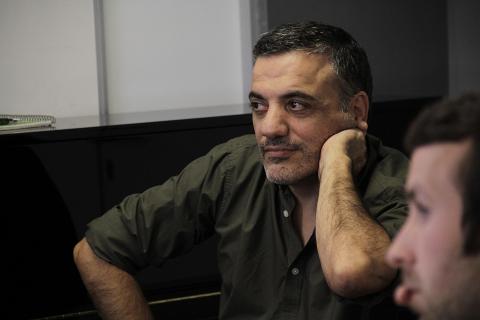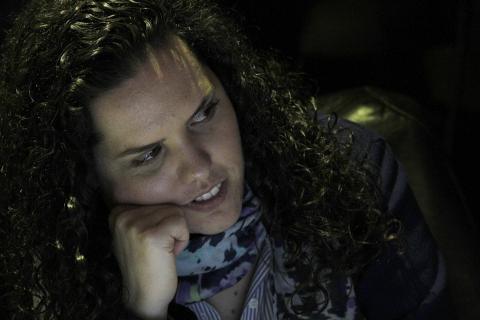Students in Berklee's Graduate Film Scoring Program Ready to Orchestrate Their Careers

Lucio Godoy, director of the graduate program in Scoring for Film, Television, and Video Games
Histeria Producciones

Vanessa Garde, assistant professor in the graduate program in Scoring for Film, Television, and Video Games
Histeria Producciones
Within weeks of unpacking their bags in Valencia, Spain, students in Berklee’s graduate program in film scoring are on a stage, in a concert hall in the Palau des les Arts, or on Skype across Europe, recording their compositions with professional musicians. Two weeks later, they’ll do it again with new pieces they’ve written. It’s a pace they’ll keep up all year.
“This one-year program is very condensed, very intense,” says Lucio Godoy, director of the Scoring for Film, Television, and Video Games program. The idea, he says, is to approximate the professional world as much as possible. In this world, deadlines are non-negotiable and the only thing sandwiched between a finished film and its set-in-stone premiere date are the few weeks composers have to write, rewrite, record, edit, and mix the score.
This concentrated experience is one of the ways in which students learn what their limits are so that they can exceed them. The opportunity to go beyond their artistic constraints is among the main goals Godoy has for his students. “I want them to try to find out what is holding them back, and often it’s themselves, that bad character we have in our heads that’s saying, ‘Oh, you’re nothing.’ "
Ana Kasrashvili G'15 found that the program allowed her to develop an entirely unexplored side of her musicianship. Despite having a strong classical background as a pianist, she had never composed anything related to film music when she entered the program in the fall of 2014. A year later, she won a California Independent Film Festival Film Scoring Competition award for a piece she wrote for an eight-minute movie. She's now working in television production back in her home country of Georgia.
"Basically, all the projects that I am involved in would not happen without the skills that I gained at Berklee," she says. It was in the film scoring program that she "realized how many important things I was missing before and how I could enrich my skills."
Aside from surpassing previous limitations and getting a taste of the real world of film scoring, another major advantage to scoring with professional musicians the whole year is that students leave the program with a strong portfolio. Many students, in fact, find jobs based on the caliber of these portfolios, says Vanessa Garde ‘10, an assistant professor in the program who graduated from Berklee in Boston with a film scoring major.
Kasrashvili's experience is a testament to these opportunities. "Right after graduation I immediately got projects related to film music and orchestra," she says.
Garde points out that in addition to helping students build high-level portfolios, it’s also important that teachers are active film scorers who can provide real-world guidance and perspective. She spent much of the previous year traveling to Madrid every weekend to work with renowned composer Alberto Iglesias on the score for Ridley Scott’s Exodus: Gods and Kings. And Godoy is known for working on many Almodovar films, also with Iglesias.
Other teachers, such as Alfons Conde and Pablo Schuller, have been active in Los Angeles and Spain. In 2015, Robert Kraft, the former head of music at 20th Century Fox, joined the team as a visiting instructor. Kraft is also working with the graduate music business program in Valencia.
A Sound Foundation
While keeping up their writing and recording schedules, the 35 or so students in the program also master the technical and theoretical tools they need to walk into any scoring job and start working. Core classes include Narrative Analysis, Orchestration 1, Knowing How to Use Your Digital Audio Workstation, and Scoring for Video Games. In addition, each student gets 30 minutes of private instruction per week.
It was in Godoy's Narrative Analysis class that Kasrashvili says she gained an understanding of the key points of film scoring, the importance of reading the scene, and of finding her own approach. And in Garde's classes she learned "so many important elements, not only related to technology but also about film scoring techniques, composing, orchestration, music structure analysis, etcetera."
“The skill set that they get here, it’s enormous,” says Garde, who teaches Computer and Synth Applications for Film, in which students learn how to work with DAW workstations, sequencers, sample libraries, and to be proficient on different platforms. “So they don’t have any fear of the technology they might find in a professional studio when they’re out in the field.”
The campus’s tech labs are set up so that students can each replicate on their workstation exactly what the teacher is creating for the class. “It’s not the same just to be sitting on the computer taking notes, copying what the teacher says,” Garde says. In the spring she teaches Dramatic Electronic Production, in which students can learn how to create their own sound design and sound libraries.
Now, Kasrashvili says, in addition to composing and orchestrating, she can work in a digital audio workstation, create a mockup, record, and understand the basic concept of technical workflow.
With these skills, students can pursue careers as music editors, orchestrators, programmers—anything across the whole spectrum of film scoring. “The main thing here," says Garde, "is that they can decide their path."
